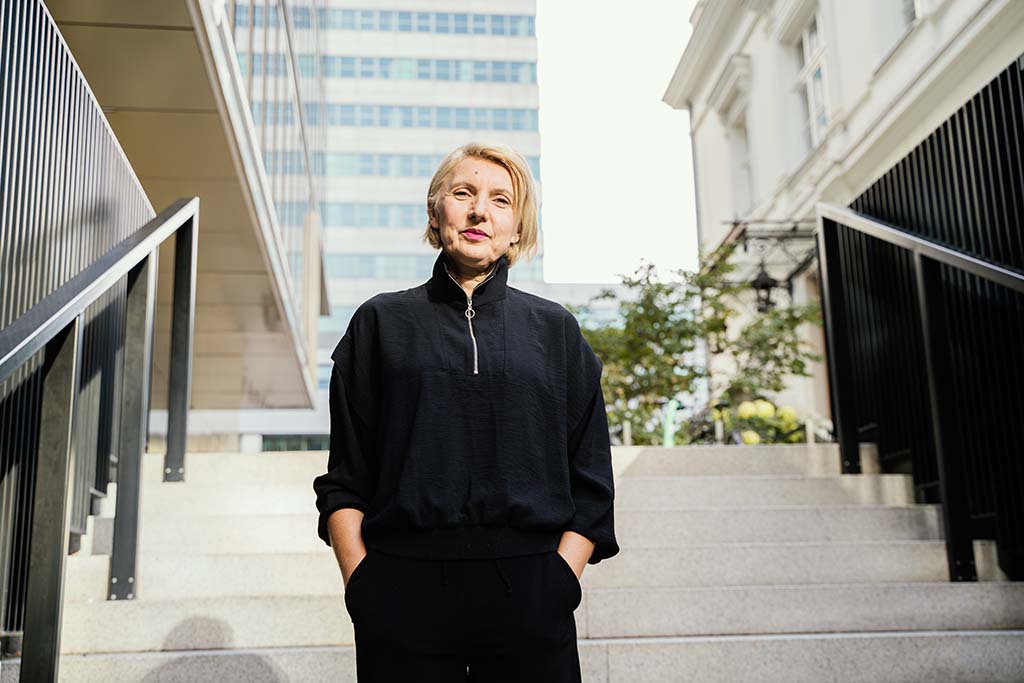”Sometimes that meant protesting in the streets”
United Women Banja Luka’s work has helped women escape violence and reclaim their voices. Through a 24-hour SOS hotline and safe house, they offer protection and hope for women and children fleeing abuse.

United Women Banja Luka (Fondacija Udružene Žene, Banja Luka), one of Kvinna till Kvinna’s partner organisations, is one of the pioneers of the women’s movement in Bosnia and Herzegovina. Since the ‘90s, they have been working for gender equality and peace.
The organisation’s work is broad in scope. They strengthen and promote women’s rights through advocacy, service provision and coalition-building. Their partnerships span both national institutions—ministries, gender equality mechanisms, the judiciary—and cross-border alliances with feminist groups abroad.
A lifeline for women escaping violence
“Part of our activities is directed toward organising services for women. At the moment, we offer legal and psychological counselling. We also run an SOS line and a safe house for women and children who are victims of domestic abuse,” says Aleksandra Štrbac, on-call expert associate at the shelter for women and children run by United Women Banja Luka.
The SOS hotline is open 24 hours a day—free, anonymous and available to anyone experiencing domestic or gender-based violence. Callers receive psychological support, legal guidance and advice on how to help others at risk.
The organisation also runs a safe house for women and children, offering temporary refuge and support. Survivors can be referred by social services or police or seek shelter themselves.
Legal support remains a cornerstone of their work. Women across the Banja Luka region receive help preparing legal documents related to divorce, custody or protection orders—ensuring their rights are upheld in practice, not just on paper.
A civil society built from scratch
After the war ended in Bosnia and Herzegovina, the civil society barely existed. Back then, there were structures in place which meant that human rights and people’s needs were not properly represented. United Women Banja Luka played a major part in post-war peacebuilding and the creation of the civil sector.
“We started building it from scratch and learned a lot from our international partners that came to assist us both with funding and with advice and knowledge, and we tried to make the civil sector grow by encouraging, especially young people or vulnerable groups, to join and to form a collective voice in our society, to basically voice their needs.”
“Sometimes that meant building partnerships,” she continues. ”Sometimes that meant protesting in the streets.”
United Women Banja Luka has collaborated with other non-profit organisations and played a key role in supporting and strengthening other women’s organisations across the country, offering training, support and liaison. But their early efforts focused on urgent humanitarian needs.
“We went into the field, spoke directly with women, and asked what they needed,” Aleksandra explains.
Addressing sexual violence
It took a very long time before sexual violence—especially as a weapon of war—was openly discussed in society. United Women Banja Luka was among the first to confront the issue, working directly with survivors and bringing attention to crimes that had long been silenced. Many were refugees or internally displaced, facing complex and often urgent needs in the aftermath of war.
“There were very few of us addressing it at the time,” Aleksandra says. “It put us in the spotlight. It’s a deeply sensitive subject, and we had to learn how to both speak out and provide support in a way that survivors could trust.”
Today, United Women Banja Luka continues its work to protect women and children from violence and to advance gender equality. Despite the many challenges, the organisation stands firm in its mission—to ensure that every woman can live free from violence and participate fully in society.
The Kvinna till Kvinna Foundation has worked for women’s rights in Bosnia and Herzegovina since 1993.